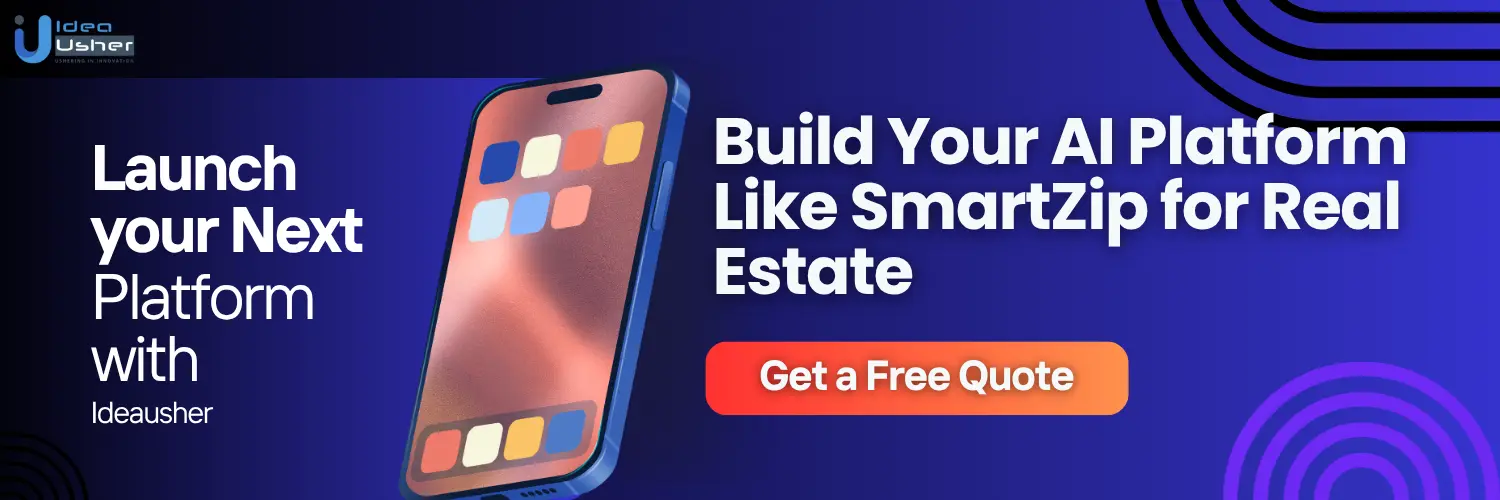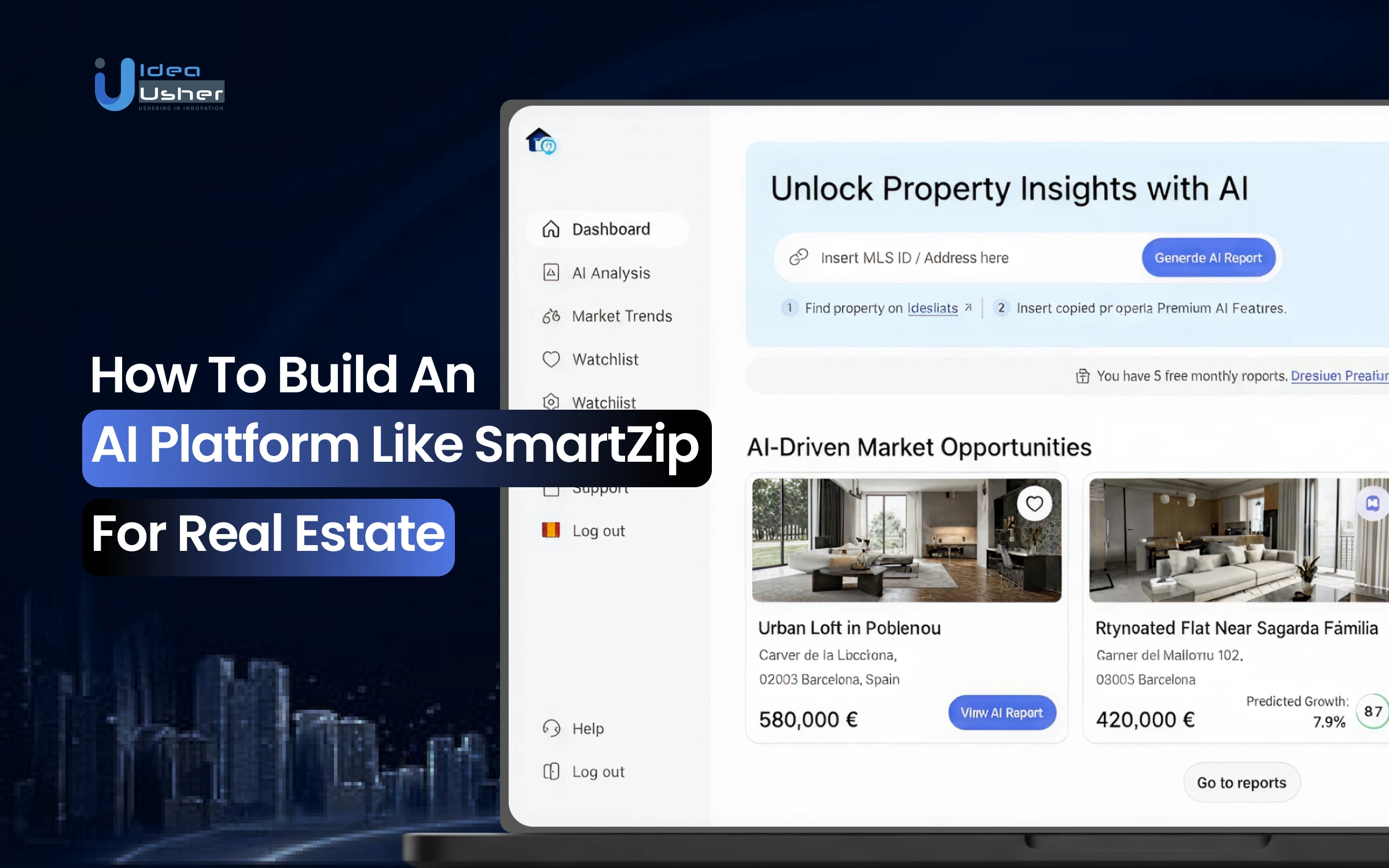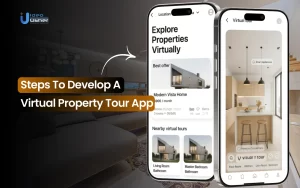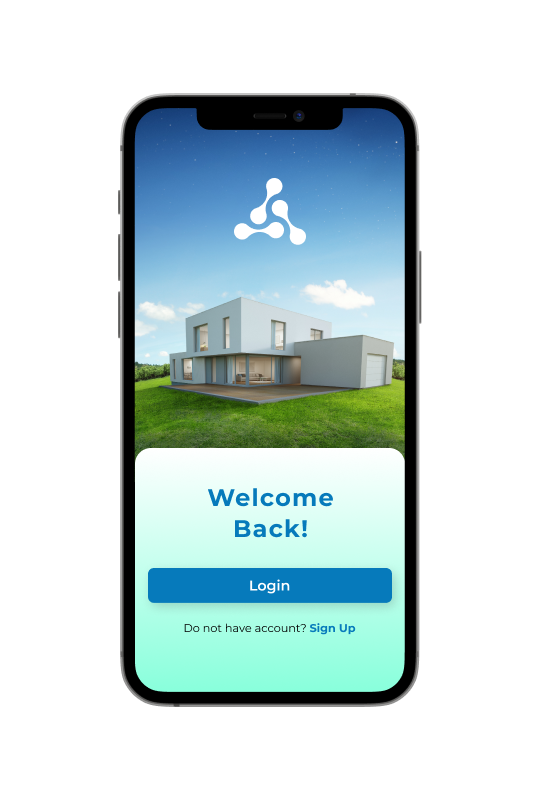In real estate, timing is crucial. Agents often miss key opportunities when trying to connect with potential clients. An AI platform like SmartZip can help by predicting when someone is ready to buy or sell, making it easier to target the right leads at the right time. This not only saves time but also increases the chances of closing more deals efficiently.
By blending predictive analytics, ML, and automation, these platforms help real estate professionals work smarter, not harder. They turn raw data into actionable insights, identifying high-value leads and streamlining marketing efforts with precision. Investing in a platform like this presents a great opportunity for businesses to tap into the growing real estate market and stay ahead of the competition by offering more efficient, data-driven solutions.
In this blog, we’ll discuss how to build an AI platform like SmartZip, exploring the essential features, technologies, and development roadmap needed to create a solution that truly empowers the modern real estate industry.
Having spent over a decade in the proptech sector, we’ve developed several AI-powered real estate solutions that use predictive analytics and ML. Thanks to this expertise, we can help real estate businesses develop AI-powered real estate lead generation platforms like SmartZip, which can help agents predict homeowner behavior, identify high-value leads, and streamline their marketing efforts.
Key Market Takeaways for AI in Real Estate
According to MaximizeMarketResearch, the AI in the real estate market is on an impressive growth trajectory. It’s expected to reach $1803.45 billion by 2030, growing at a CAGR of 35%. This rapid growth highlights how AI technologies are reshaping real estate operations, especially in lead generation, where they help agents connect with buyers and sellers more effectively and efficiently.

Source: MaximizeMarketResearch
AI-powered lead generation platforms are making it easier for real estate agents to engage with prospects 24/7. Features like AI chatbots, predictive lead scoring, and personalized outreach help agents stay connected without needing to be constantly available.
By automating tasks like capturing lead details, qualifying leads, and scheduling showings, these platforms save time and boost conversion rates. Platforms such as Zillow Premier Agent and Ojo Labs are leading the way with these technologies.
Zillow Premier Agent uses AI to connect agents with interested buyers quickly, sending real-time lead alerts and routing them efficiently to avoid missing any opportunities. On the other hand, Ojo Labs uses AI assistants to provide personalized recommendations and pre-qualify leads. This blend of technology and user-centered service helps improve the overall customer experience, making it easier to convert leads into clients.

What is the SmartZip Platform?
SmartZip is a predictive real estate lead generation platform that leverages big data and artificial intelligence to help agents find homeowners most likely to sell their properties soon. It helps real estate professionals optimize their marketing efforts by providing qualified leads, automating follow-ups, and delivering valuable insights to increase listing opportunities.
Seven key features that make SmartZip stand out are:
- Smart Data: The platform uses predictive analytics with over 250 data points—such as home value, ownership history, and demographics—to accurately forecast which homeowners might sell in the next 12 to 18 months.
- Smart Targeting: It automates multi-channel marketing, including email campaigns, targeted online ads on platforms like Google and Facebook, and direct mail, ensuring leads are nurtured consistently.
- Smart Home Price: The platform includes custom landing pages with home valuation tools that capture leads when prospects show interest in selling.
- CRM Integration: A built-in CRM allows agents to manage campaigns, track leads, automate follow-ups, and organize leads, simplifying the sales process.
- Direct Mail Campaigns: Agents can send personalized, branded postcards, letters, and mailers to targeted prospects using customizable templates and automated scheduling.
- Lead Alerts & CheckIn App: The platform provides real-time lead alerts and daily action plans to help agents prioritize outreach and maintain personalized communication.
- Reach 150: This feature collects client reviews from across the web, showcasing them to enhance an agent’s reputation and credibility with social proof.
How Does the SmartZip Platform Work?
SmartZip uses data to predict which homeowners are most likely to sell by analyzing property records, financials, and online activity. It then automates marketing campaigns to reach these potential sellers through mail, ads, and landing pages. Finally, it helps agents follow up with personalized insights and actions through its CheckIn App to maximize lead conversion.

1. Smart Data & Predictive Analytics
At the heart of SmartZip is the power of data. The platform begins by analyzing an extensive dataset to predict which homeowners are most likely to sell in the near future. Here’s how it does that:
Data Aggregation: SmartZip gathers data from over 140 million properties, pulling in details from a wide range of sources such as:
- Public Records: Information like tax assessments, deed transfers, mortgage data, and property features.
- Homeowner Financials: Key financial insights like loan-to-value ratios, equity levels, and ownership duration.
- Behavioral & Market Data: This includes online activity, local market trends, and sales velocity in neighborhoods.
The Predictive Algorithm
The platform uses this rich dataset to power a machine learning model that calculates a Seller Score for each property. This score predicts the likelihood that a homeowner will sell within a 6 to 18-month window, helping agents focus their efforts on the most promising leads. Instead of targeting entire neighborhoods, agents receive a list of the top 10-20% of homeowners who are most likely to sell, saving time and resources.
2. Smart Targeting & Automated Marketing
Once SmartZip identifies potential sellers, the next step is to reach out to them with targeted marketing campaigns:
Automated Marketing Campaigns: SmartZip runs multi-channel campaigns designed to nurture leads and keep the agent’s brand top-of-mind. These campaigns typically include:
- Direct Mail: Professionally designed postcards and letters that are sent to high-potential leads based on their Seller Scores.
- Digital Ads: Targeted ads on platforms like Facebook and Google, where ads are tailored to Custom Audiences created from the list of high-probability sellers.
- Branded Landing Pages: The system generates custom landing pages that offer valuable services like free home valuations, capturing the lead’s contact information when they interact.
The goal of this strategy is simple: to ensure that when these homeowners are ready to sell, the agent is the first person they think of.
3. The Check-In App & Follow-Up
The final pillar ensures that agents act on the leads generated by the previous steps. This is achieved through SmartZip’s CheckIn App, which helps agents stay organized and proactive in their follow-ups.
Daily Action Plan: The app provides agents with a daily to-do list that prioritizes actions based on the latest lead data. For example:
- Lead Alerts: Notifications about prospects whose Seller Scores have recently increased.
- Hot Leads: Alerts when a lead engages with marketing materials, like visiting a landing page or interacting with an ad.
- Deep Insights: The app gives agents detailed insights about the homeowner, such as property value, estimated equity, and length of residence, helping them have more relevant and personal conversations.
Activity Logging: The CheckIn App also functions as a lightweight CRM, allowing agents to track calls, emails, and notes about each lead, helping to manage the entire lead journey and ensure no opportunity is missed.

What is the Business Model of the SmartZip Platform?
SmartZip operates on a subscription-based business model primarily targeting real estate agents and brokers. The platform offers predictive analytics and automated marketing tools, empowering users to enhance their lead generation and marketing efforts.
Business Model and Revenue Streams
SmartZip generates revenue by charging real estate professionals subscription fees for access to its suite of tools. These plans typically start at around $500 per month, but many customers end up spending over $1,000 monthly, depending on the targeted areas and specific features they select.
The company’s offerings include:
- Smart Data: Predictive analytics that scores leads based on over 250 data points.
- Smart Targeting: Automated marketing campaigns, such as email sequences, direct mail postcards, and online ads.
- CRM Tools: A lead management system to streamline campaign automation.
- Referral Management: Integration with Reach150 for reputation and referral management.
The platform’s tiered services enable real estate agents to customize their marketing strategies by focusing on the most promising leads in their targeted zip codes and areas.
Financial Performance and Market Position
SmartZip’s estimated annual revenue is approximately $4.1 million as of 2025. The company operates with a lean team of around 39 employees, generating $106,400 in revenue per employee. While employee growth has been slightly negative (-5%), SmartZip remains a significant player in real estate tech, particularly within the marketing automation and predictive analytics sectors.
Funding History
SmartZip has secured $30.6 million in funding through multiple rounds:
- Series A (2009): Raised $2.1 million to develop its platform.
- Series B (2014): Secured $12 million, led by Crest Capital Ventures and Intel Capital, which helped expand product offerings and sales capabilities.
- Debt Financing (2016): Raised $12 million to expand into the mortgage vertical and launch new tools like SphereTargeting.
- Additionally, the company raised $4.5 million in 2010.
Strategic Developments
SmartZip is expanding into the mortgage sector by offering marketing tools tailored for mortgage lenders. It also acquired Reach150 to strengthen its referral marketing capabilities. The company is partnering with blockchain tech to enhance real estate data security and transparency, which could provide significant benefits to its users.
Market Stats and Position
- Market Position: SmartZip is the second-largest data provider in the real estate tech space, following Zillow.
- Lead Generation: The platform is known for its precision in AI-driven lead generation, with claims of identifying leads that are 70% more likely to sell.
- Recognition: SmartZip has received notable accolades, including Inc. 5000 and Red Herring Top 100 awards, recognizing its growth and innovation in real estate marketing.
By focusing on high-probability leads and automating marketing efforts, SmartZip enables real estate agents to optimize their marketing spend and boost their ROI.
How to Build an AI Platform Like SmartZip for Real Estate?
Over the years, we’ve built a lot of AI platforms like SmartZip for real estate, helping professionals identify high-potential leads and optimize their marketing efforts. Here’s a breakdown of how we create these platforms for our clients.

1. Data Aggregation and Integration
We collect a wide range of property-related data, including public records, mortgage details, and consumer behavior signals. Using APIs from trusted sources like CoreLogic, ATTOM Data, Zillow, and Google Ads, we automate the ingestion process. Afterward, the data is cleaned, normalized, and merged into a unified dataset using ETL pipelines.
2. Develop the Predictive Model
We select the best machine learning models, such as Gradient Boosting or Random Forests, to analyze historical sales data and identify high-probability selling patterns. We refine these models with feature selection and temporal weighting to increase prediction accuracy over time.
3. Build Automated Marketing Integration
We integrate APIs that link predictive outputs with marketing platforms like CRM tools, ad networks, and direct mail systems. This allows for trigger-based campaigns, where ads or emails are automatically launched when certain changes occur. We also include A/B testing for campaign optimization.
4. Agent Dashboard & Mobile App
We create an intuitive agent dashboard and mobile app that offers lead alerts, CRM integration, and task management. With visual tools like heatmaps and charts, agents can track active “Smart Farms” and easily view opportunities. The app syncs with third-party CRMs like Salesforce and HubSpot for smooth workflow management.
5. Feedback Loops & Continuous Learning
We capture marketing outcomes such as clicks, calls, and conversions and feed this data back into the model. This allows the platform to continuously learn from real-world data, improving prediction accuracy over time through regular retraining cycles.
6. Compliance & Data Privacy
We ensure compliance with regulations like the Fair Housing Act and FCRA by integrating necessary checks and audit layers. Additionally, we prioritize data security with encryption and anonymization measures, guaranteeing the privacy of user information throughout the system.

Successful Business Models of AI Platforms for Real Estate
The real estate lead generation market is huge and always growing. Agents are constantly on the lookout for reliable sources to fill their pipelines with qualified buyers and sellers. The right business model can truly make a platform stand out and thrive, as it shapes everything from user engagement to long-term success.

1. The Tiered SaaS Subscription Model
This is the model used by SmartZip and is one of the most well-established approaches in real estate lead generation. It’s a classic Software-as-a-Service model where agents pay a recurring fee for access to a platform that helps them generate and manage leads.
Revenue Streams & Stats:
- Monthly Subscriptions: The primary revenue stream comes from monthly subscription fees, ranging from $300 to $1,000+ per agent, depending on the plan and included marketing credits. With 10,000 subscribed agents paying an average of $500/month, a platform could generate $60 million in annual recurring revenue (ARR).
- Onboarding/Setup Fees: Some platforms charge a one-time fee for account setup, which can range from $1,000 to $3,000 to cover training and configuration costs.
Estimated Monthly Revenue Potential:
- Per Agent: $300 – $1,200+
- Platform Potential (with 1,000 agents): $300,000 – $1.2 million
For example, SmartZip’s SaaS model centers on providing predictive analytics and lead generation through automation. Agents subscribe to receive targeted, pre-qualified leads regularly, creating a predictable, scalable revenue stream for the platform.
2. The Pay-Per-Lead Marketplace Model
In this model, the platform acts as a marketplace for leads. It generates leads through its own marketing efforts and then sells those leads directly to agents. These platforms use methods like SEO, PPC ads, and content marketing to attract homeowners, who then submit their information to become leads.
Revenue Streams & Stats:
- Cost-Per-Lead (CPL): The price per lead can range from $20 to $100 for typical buyer or seller leads. For highly qualified or exclusive seller leads, the cost can go as high as $150 – $500+.
- Geographic Exclusivity: Some platforms sell exclusive access to leads in specific ZIP codes or areas, often charging between $1,000 and $3,000 per month for exclusivity.
Estimated Monthly Revenue Potential:
- Per Lead: $20 – $500+
- Platform Potential (selling 5,000 leads/month): $100,000 – $2.5 million
For example, Market Leader, now part of Homes.com, was a classic example of a pay-per-lead platform. It successfully connected agents with qualified leads, operating on the premise that agents would pay a fixed price for a guaranteed number of leads.
3. The Percentage-of-Commission Model
This model takes a more risk-sharing approach by not charging agents upfront for leads. Instead, the platform generates leads and only earns revenue when the agent successfully closes a deal. In return, the platform takes a percentage of the agent’s commission.
Revenue Streams & Stats:
- Referral Fee: Typically 25% to 35% of the agent’s commission. For example, on a $15,000 commission from a home sale, the platform would earn $4,500 at a 30% referral fee.
- Conversion Rates: Top platforms target conversion rates of 2% to 4%. A higher conversion rate translates to more revenue for the platform.
Estimated Monthly Revenue Potential:
- Per Closed Transaction: $3,000 – $6,000 (based on 25-35% of a typical commission)
- Platform Potential (closing 100 transactions/month): $300,000 – $600,000
Opcity mastered the referral fee model by using a real-time matching engine that connects agents directly to leads. The platform takes a 30-35% referral fee for each successful deal closed, making it an attractive model for agents who don’t want to pay upfront.
4. The Freemium & Ad-Supported Model
This model revolves around offering a valuable set of free tools and services to agents in order to build a large user base. Once the platform has a significant number of agents using its free tools, it monetizes the traffic through advertising and premium upgrades.
Revenue Streams & Stats:
- Advertising Sales: Platforms with large user bases can sell banner ads, sponsored content, and featured placements. A site with 1 million monthly visitors can generate anywhere from $50,000 to $200,000 per month from advertising.
- Premium Upgrades: Free users can be converted to paying customers for access to advanced features, premium tools, or more leads. Even a modest conversion rate of 3% from a base of 100,000 free users can generate significant revenue.
Estimated Monthly Revenue Potential:
- Ad Revenue: $50,000 – $200,000 (for 1M web visitors)
- Upsell Revenue: $300,000 (from 3% of 100,000 free users paying $100/month)
Common Challenges of an AI Platform for Real Estate
After working with many clients, we’ve noticed a few key challenges real estate AI platforms often face. These issues can really hold back the full potential of the platform. Fortunately, we’ve figured out some solid ways to overcome them effectively.
1. Fragmentation and Inconsistency
Real estate data often comes from multiple sources with varying formats and update frequencies. Different systems might label the same data point in different ways, making it difficult to integrate and use effectively. This creates a time-consuming task of cleaning data, which detracts from AI development.
Our Solution
We build ETL (Extract, Transform, Load) pipelines to standardize and clean data automatically. Using schema mapping, we unify data definitions (e.g., mapping “SqFt,” “SquareFootage,” and “Area” to one standard). This results in a clean, reliable dataset that feeds into AI models accurately.
2. Privacy and Legal Risks
Using personal and financial data for AI predictions can definitely put platforms at risk of violating privacy laws like GDPR or CCPA. You could also unintentionally create bias that might breach Fair Housing laws if you’re not careful with how the data is handled..
Our Solution:
We ensure compliance is built into the system from the ground up:
- Consent Management Platforms: These platforms ensure all user data is collected and used in compliance with relevant privacy laws.
- Data Anonymization: We anonymize personally identifiable information (PII) early in the data processing stages, minimizing privacy risks.
- Bias Detection Modules: We integrate mechanisms that continually audit the AI’s predictions, ensuring no unintentional bias exists, thus adhering to Fair Housing laws and other regulations from day one.
3. Model Drift and Accuracy Loss
Real estate markets change quickly. An AI model trained on past data becomes less accurate as market conditions, homeowner behaviors, and economic factors shift. This issue, known as model drift, can reduce the quality of leads.
Our Solution:
We implement automated retraining cycles to keep models updated with fresh data. Additionally, we set up real-time monitoring dashboards that track model performance, allowing us to detect and address drift before it affects the system.
4. Marketing Integration Complexity
Even with accurate predictions, the real value comes from activating those predictions through marketing. Integrating multiple CRM and marketing platforms (e.g., Google Ads, Facebook) can be complex and fragile in a monolithic system.
Our Solution:
We use a microservices approach where each part like data ingestion, scoring, and ad management works independently. This makes it easy to add new platforms without causing any disruptions. It also helps scale services when needed without impacting the system as a whole.
Tools & APIs for an AI Platform Like SmartZip for Real Estate
Building an AI platform for real estate, like SmartZip, requires a well-structured approach to integrating data, analytics, cloud infrastructure, marketing automation, and compliance. Here’s an outline of the essential tools, APIs, and frameworks for each core component of your platform.
1. Data & Analytics Stack
The data and analytics stack is the backbone of the AI platform. It transforms raw data into predictive intelligence.
Programming Languages & Libraries:
Python & R:
- Python is the leading language for AI and data science due to its extensive ecosystem, such as TensorFlow, PyTorch, and Scikit-learn.
- R excels in statistical analysis, making it ideal for initial modeling or complex data analysis.
Pandas & NumPy: These libraries are essential for data wrangling, cleaning, and preprocessing, which is critical for handling data from multiple sources.
Scikit-learn: A powerful tool for classical machine learning algorithms like Random Forests and Gradient Boosting, well-suited for structured data like property details, demographics, and sales history.
TensorFlow & PyTorch: If your platform plans to handle unstructured data, such as images, natural language, or advanced time-series forecasting, these deep learning frameworks will be required.
Feature Engineering:
Building predictive features is the key to success in real estate AI. Some of the essential features could include:
- Loan-to-value ratio
- Months since last refinance
- Local market velocity score
- Online behavioral intent score
These features can drastically enhance model accuracy and prediction reliability.
2. Data Sources & Ingestion APIs
The AI platform needs high-quality, diverse data sources to make accurate predictions.
Core Property Data:
CoreLogic, ATTOM Data, Black Knight: APIs from these sources offer essential real estate data such as property tax assessments, deed transfers, mortgage details, and sales history.
Market Context:
Zillow API: To access local market trends, home value indices (ZHVI), and neighborhood dynamics, crucial for pricing predictions and market trend analysis.
Intent & Behavioral Data:
Custom or Proprietary Data: Building a proprietary dataset based on online behavior data (anonymized) can help predict the likelihood of a person moving (known as “pre-movers”). Using platforms like Google Analytics or Mixpanel can offer insights into user intent.
Marketing Execution
Google Ads API and Meta Ads API: These allow programmatic control over campaigns, helping you to build custom audience segments, track conversion metrics, and manage ad campaigns directly from the platform.
3. Cloud Infrastructure & Data Warehousing
A scalable cloud infrastructure is necessary to support massive amounts of real estate and behavioral data.
Cloud Providers: AWS, Google Cloud Platform (GCP), and Microsoft Azure are the top choices, providing the complete suite of tools for data storage, AI model training, and deployment.
Key Services:
| Category | Tools/Services | Description |
| Data Warehousing | Amazon Redshift, Google BigQuery, Snowflake | These platforms offer scalable storage and efficient querying of large datasets, ideal for handling high volumes of property listings, market data, and user behavior. |
| AI/ML Services | Amazon SageMaker, Google AI Platform, Azure Machine Learning | These services provide end-to-end solutions for building, training, and deploying machine learning models, automating much of the ML pipeline. |
| Compute & Orchestration | AWS Lambda, Kubernetes | AWS Lambda offers serverless functions, while Kubernetes provides container orchestration, both enabling automated scaling for running predictions and data pipelines. |
4. Marketing & Automation Integration
AI predictions must be actionable. This is where marketing automation and CRM systems come into play.
CRM & Marketing Automation:
- HubSpot API or Salesforce API can automate lead management, scoring, and nurturing. These systems allow for seamless communication with agents and ensure leads are consistently followed up on.
Multi-Channel Execution:
- Platforms like Zapier or custom webhooks can integrate the AI platform with email, SMS, or direct mail services, ensuring leads are reached through multiple channels.
- SendGrid for email campaigns and Postcardmania for direct mail could be leveraged to reach prospective homeowners or buyers.
Unified Customer View:
Every customer interaction, from email opens to landing page visits, should be captured and logged within a single profile. This helps agents understand the full customer journey and tailor their outreach efforts.
5. Compliance & Security
Real estate data often includes sensitive information, so strong compliance and security measures are a must.
Identity & Access Management:
AWS Cognito or Auth0 provide robust solutions for managing user authentication, ensuring secure logins for both agents and homeowners.
Authorization:
Implementing OAuth 2.0 allows for secure API communication, ensuring that third-party integrations (like Google Ads or Zillow) are protected.
Data Protection: GDPR and CCPA compliance is a legal necessity when dealing with personally identifiable information (PII).
- This involves encryption-at-rest and encryption-in-transit (TLS) to protect sensitive data.
- Regular security audits should be part of your routine to identify vulnerabilities and ensure compliance.
Fair Housing Layer:
A bias detection system must be implemented to ensure that predictions do not inadvertently discriminate against protected classes. Regular audits to check the disparate impact of models on different demographic groups are crucial.
Conclusion
Building an AI platform like SmartZip can completely transform the way real estate works. If you own a business or platform, the real opportunity is in owning the AI infrastructure that drives smarter real estate decisions. With the right technical foundation and AI expertise, any company could follow SmartZip’s example and create a profitable, future-ready PropTech platform. This kind of investment could change the game for real estate professionals and help businesses stay ahead of the curve.
Looking to Develop an AI Platform Like SmartZip?
At Idea Usher, we specialize in turning your vision into a competitive advantage. With more than 500,000 hours of coding experience and a team led by former MAANG/FAANG developers, we bring the technical expertise needed to build the AI, data pipelines, and automation that platforms like SmartZip rely on.
Why Choose IdeaUsher?
- From Data to Dollars: We build the pipelines that transform raw property data into actionable sales forecasts, giving you a clear edge in decision-making.
- Compliance-Built-In: We ensure that your AI is not only powerful but also ethical and compliant with Fair Housing standards, helping you build trust with users.
- Seamless Automation: Our automation connects AI-generated scores to marketing efforts, like direct mail and digital ads, so your campaigns run smoothly while you focus on growing your business.
- See It to Believe It: Take a look at our portfolio to see the kind of transformative work we deliver and the results we drive.
Ready to build smarter? Check out our latest projects and let’s discuss how we can bring your ideas to life.
FAQs
A1: The cost of building an AI platform like SmartZip depends on several factors like the features you want to include, the complexity of integrations, and the volume and quality of the data you’re working with. Generally, it can be a significant investment, but it’s crucial to tailor the platform to your business needs and scale over time.
A2: Yes, this type of platform can definitely be monetized through a SaaS model. Subscription plans for real estate agents, offering access to premium leads, or providing white-label solutions for brokerages are common ways to generate revenue. This model allows you to create a steady income stream while scaling the platform.
A3: Replicating SmartZip’s success comes with its own set of challenges. One of the biggest hurdles is data acquisition, as gathering accurate and comprehensive data from various sources can be complex. Additionally, tuning predictive models to ensure accuracy and integrating automated campaign workflows for seamless marketing execution can also pose technical difficulties.
A4: To train the AI model effectively, you’ll need a variety of data, including property records, demographic data, mortgage details, and behavioral insights such as online search activity. This data helps the model predict market trends, identify high-potential leads, and deliver valuable insights for real estate professionals.

























